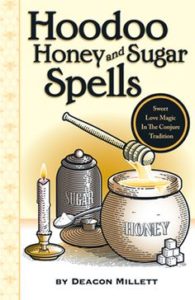Powers and Principalities
I have a new book coming out next week, but I am going to resist the irresistible temptation to talk about it. I will, however, talk about a prominent element in the book that reaches far beyond the pages of my humble story.
In my new book, the main character seeks out the help of a Mississippi swamp hoodoo practitioner, or “root doctor” as they often prefer to be called. Hoodoo is different from voodoo, in that it is much more nature-focused and medicinal, rather than reading the bloody guts of disemboweled chickens or pushing pins into dolls to torment one’s enemies, as is the common theatrical portrayal  of voodoo. Still, there is a definite mystical component of hoodoo that hearkens back to pagan rituals and pantheism. It may seem less “sinister” than voodoo but it grows from the same root.
of voodoo. Still, there is a definite mystical component of hoodoo that hearkens back to pagan rituals and pantheism. It may seem less “sinister” than voodoo but it grows from the same root.
I incorporated this practice into my story for dramatic effect but more importantly, to warn readers of the dangers of dabbling in these very dark, and very real, powers. Make no mistake: magic is very real, and none of it is good.
The world of fiction is much more complicated in regards to magic and spiritualism than the real world. In books, we find good and bad wizards and witches, evil powers being used for good and vice versa, spells, potions, rituals, incantations, etc., all being used for a wide variety of purposes and springing from countless sources. Some stories, such as The Chronicles of Narnia, employ magic in an allegorical manner to mirror Christian truths in our real world. Others are tales that are not meant to be more than entertainment but the incredible power being wielded in the story can easily be a metaphor for real-world power, such as wealth, intelligence, beauty, and strength, all of which can be used for good or ill. More often than not, fictional magic isn’t based on real-world religions and deities, because honestly, that’s not very “magical.” If God and the devil and angels and demons are present in the story, it becomes “spiritual” or “paranormal” or “supernatural,” which can have its own degrees of factual or fictional depictions.
However, in the real world, it is very cut-and-dried. There is no such thing as “good” magic. All good supernatural power comes from God alone. Anything else is evil. I know I sound like a grumpy old dad (and I’m getting there very quickly) but these are not my words. Consider the Word of God:
“Do not turn to mediums or necromancers; do not seek them out, and so make yourselves unclean by them: I am the Lord your God” (Lev. 19:31).
“See to it that no one takes you captive by philosophy and empty deceit, according to human tradition, according to the elemental spirits of the world, and not according to Christ” (Col. 2:8).
“Outside are the dogs and sorcerers and the sexually immoral and murderers and idolaters, and everyone who loves and practices falsehood” (Rev. 22:15).
There are dozens of verses in the Bible which speak out against magic and sorcery, along with numerous instances in which sorcerers compete against the prophets and disciples for supernatural supremacy (guess who wins every time). There are only two sources of supernatural power: God and His angels, and Satan and his demons. There are no “fire spells” or “water spirits” but there are powers and principalities that are doing battle everyday for our souls.
I have no problem with fictional magic. Let Gandalf and Harry Potter and Tinker Bell do their thing. But as believers, we need to be careful not to let that enjoyment in our entertainment bleed over into real life, where even the brightest and happiest magic comes only from darkness.





































Excellent article. Thank you. Rarely do we see the Truth shared these days without rampant emotion and flagrant bashing about.
It’s easy for Christian fantasy fans to get all huffy and see this as a direct attack on them and their fandoms, but that’s irrelevant in the face of God’s truth. If the Christian fantasy fan is able to separate fictional and real magic in their minds and in their lives, then fine. But if they start becoming inclined to magic in the real world or thinking it is benign and harmless, then that is dangerous.
PRAISE GOD!!!! FINALLY THE TRUTH! GOD BLESS AND KEEP YOU, MARK, AND THANK YOU FOR TELLING GOD’S TRUTH!!! DO NOT EVER RELINQUISH IT!!!
HG, I’m catching your drift. However, every regular writer at Speculative Faith would agree with Mark’s conclusion:
In other words: sure, “Harry Potter” is okay, but don’t get involved with real-world occult activity. Is this not what we have all along been contending? 🙂
Not really, no. Not when views such as “Cast the riddikulus spell against Halloween” is the opposite of what God commands. “There shall not be found among you one who casts a spell” vs. “Cast the riddikulus spell.” Which is it? The Word of God or the word of Rowling? Mark is right about the views of fictional magic bleeding over into the real world. And for someone who’s publicly stated magic is “not a thing” and “not the sin,” no — those who teach these kinds of things have not been contending all along for what the Bible says. Magic wands openly sold at Realm Makers last year, and given the imprimatur of a tweet before the whole world? Statements like “God-Honoring magic?” What’s next? The Christian’s Book of Spells? No, this is not what has been contended all along. It’s the opposite. Listen to the Word of God.
I would venture that fictional depictions of magic are okay as long as they don’t reflect the sorcery practiced in the real world. The magic in the Lord of the Rings books are vague and typical fantasy – “dark forces,” “the Light of Earendil,” etc. Now, I personally balk at Harry Potter because it is set in modern times and utilizes terms like witchcraft, spells, etc. This is where Christian discernment comes into play. We should listen to the Holy Spirit speaking to us through our conscience and if we truly feel troubled in our spirit about something, we should stay away from it. We shouldn’t think, “Oh, I’m just being a fuddy-duddy and should get over it,” nor should we say to another, “You’re just being a fuddy-duddy and you need to get over it.” However, there are varying degrees of maturity, tolerance, and power over sinful forces among believers and we should recognize them in others. I can’t say that Harry Potter is evil and all believers should stay away from it, but I personally wouldn’t want my children reading the books or watching the movies until they were much, much older. The key is being able to discern what is real and what is fiction, and to identify what is good and evil in the real world and in fiction. My Age of Apollyon trilogy has explicit Satanic rituals and demon possession because that is a central element in the story. It’s not dressed up or made cute. As believers, we need to always be on our guard and let God’s Word and Holy Spirit direct our steps before checking out what the world is up to.
Glad to clarify: “Cast the spell” in that piece was always a metaphor, based on the book’s fictional portrayal of defeating evil by laughing and mocking it. 🙂
I agree with Mark‘s comment. I would only add the caveat that such emotional responses, or a “check in our spirit” may or may not be from the actual Holy Spirit. I have heard people argue, 100 percent convinced, that they feel a “check in their spirit” about a doctrine that is 100 percent biblical. Or they argue that a “check in their spirit” that an absolutely permissible thing is in fact a sin, not only for them, but for everyone else. This is why I’m so adamant that any such feelings must be based on actual biblical warnings. And in this situation, the Bible clearly condemns actual, real-world practice of sorcery that is based on idolatrous intent (which will always be the intent behind the practice of actual, real-world sorcery).
You nailed it!! Especially the last paragraph!
Another excellent article. It really addresses the issue head on. I have magic in my books, and at it was absolutely essential for me to develop the “truth” about the magic that runs through the heart of my books, so the readers can ultimately understand that though there are multiple things called “magic”, they are not always the same thing. It is important to the source of things, as well as judging the fruit. 😉